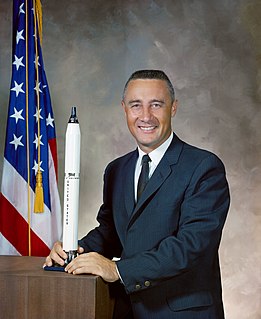A Quote by Walter Cronkite
It's hard for us to really understand the immensity so far of the conquest of space.
Related Quotes
There's a double meaning in the film The Conquest. First, the conquest of power at the UMP party and how Sarkozy had to fight his colleagues inside the party so that it was him running for President. He wins the political conquest, but he loses the feminine conquest in that his wife leaves him. It's hard for a President to be single - that's never happened.
Nothing is put on pause. Everything is still happening. And then as far as just reflecting on what got you to where you are, there aren't very many times where we have the space to sit and reflect and really understand the depth of what it took and the grit that we had to have to get to where we are.
I was transformed by picking up a pair of binoculars and looking up, and that's hard to do for a city kid because when you look up you just see buildings - and really, your first thought is to look in people's windows. So to look out of the space - out of living space - and look up to the sky, binoculars go far, literally and figuratively.
It is completely incomprehensible to us how God can reveal himself and to some extent make himself known in created beings: eternity in time, immensity in space, infinity in finite, immutability in change, being in becoming, the all, as it were, in that which is nothing. This mystery cannot be comprehended; it can only be gratefully acknowledged.
In fact, the Outer Space Treaty of 1967 bans militarization. Potential adversaries of the US, and even its allies, are so far behind that these countries are very interested in maintaining the treaty. Europe and the rest of the world want a strong reaffirmation of the Treaty and the US is unilaterally trying to derail it. Termination of the treaty would mean that the US could develop satellite weapons, put offensive weapons in space. It would probably mean using nuclear power in space. All of this leads to some very dangerous scenarios, including destruction of the species.






























